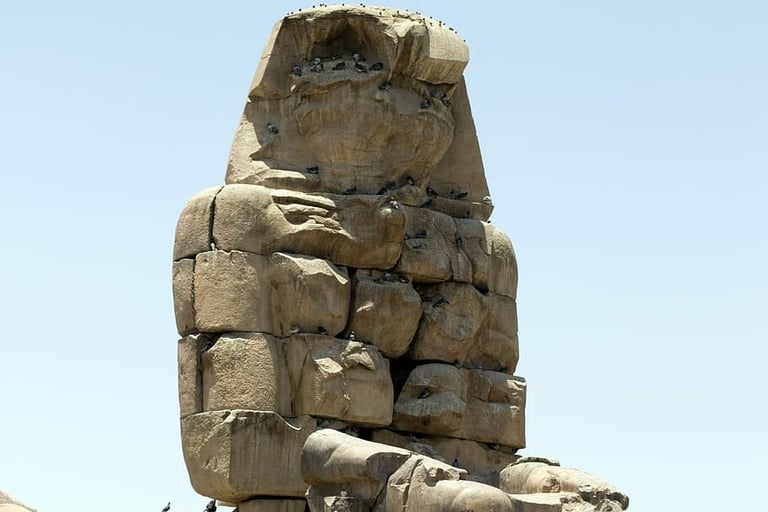Launch your professional website today Here
Ancient Egypt - Understanding Egyptology vs Pharaohs Study
Explore the reasons behind the term 'Egyptology' instead of 'Pharaonic Studies.' This article delves into the history of ancient Egypt, its rulers, and the academic field dedicated to its study, shedding light on common misconceptions and the credibility of European scholars.
DR. DAHLIA SAAD EL-DIN
Dalia Saad Eldin
8/28/20254 min read


1. First, We Must Understand the Nature of Religious Stories
Religious texts emphasise moral lessons and spiritual reflections, not historical records.
Historical accounts need specific dates, places, and evidence, which religious stories often intentionally leave out to concentrate on teaching morals and lessons.
2. The Term "Pharaoh" Became Popular Through Religious Narratives
The widespread association of the word “Pharaoh” with Egypt comes primarily from religious stories. Most people, especially in earlier times, knew nothing about ancient Egyptian history beyond what was mentioned in religious texts.
3. The "Mummy Craze" and European Obsession with Ancient Egypt
For centuries, the only thing most Europeans knew about ancient Egypt was the bizarre trade of ground-up mummies, which were believed to have healing powers or prolong life.
This strange practice—common from the 15th century through the early 19th century—spurred looting and trade in antiquities.
Given this obsession, wouldn’t it have made sense for Europeans to name their study Pharaonictology instead of Egyptology?
But they didn’t.
Why?
Because they understood the dangers of mixing history with religious narratives, especially when it came to the Exodus story and the figure of “Pharaoh.”
Remember, Europe itself suffered for centuries from confusion between religion and science.
That’s why, when they founded the academic study of ancient Egypt, they deliberately chose Egyptology—to honor the actual land and its people, not religious associations.
4. Flinders Petrie: The Man Behind the Pharaoh Myth in Egyptology
The first Egyptologist to connect the term Pharaoh to ancient Egyptian kings was Sir William Matthew Flinders Petrie (1853–1942), a British archaeologist.
He famously linked the Egyptian phrase “Per-Aa”—meaning “The Great House” or “High Palace”—to the word Pharaoh.
However, even today, there is serious debate about whether Pharaoh was ever a royal title or just a name used later.
Moreover, Flinders Petrie had a known bias: he actively sought to tie biblical stories to Egyptian history. That says a lot, doesn’t it?
5. Even Israeli Archaeologists Couldn't Find Biblical Evidence
Israeli archaeologists have explored every part of the Sinai desert since 1967 and continue excavating in Palestine, hoping to find even the faintest evidence of the Israelites’ presence in the region. They have found nothing.
Why Do We Confuse History with Religion?
The confusion between history and religious stories in our region has several causes:
Lack of Basic Knowledge of Ancient Egyptian History
Most people simply do not know the different historical periods of ancient Egypt.
Mixing History with Religion
Many mistakenly take religious narratives as literal history, partly because some religious scholars disregard the findings of historical research.
This becomes even riskier when archaeological evidence either confirms or contradicts old stories—many people feel threatened by this.
Misleading Terms Used by Scholars
Some Egyptologists—both Western and Egyptian—use terms like “Pharaonic history” or refer to kings as Pharaohs, creating the illusion of a vague, exotic, or even extinct people.
Reinforcing Historical Disconnect
By using these terms, they subconsciously push people to see ancient Egypt as disconnected from their current identity.
Intentional or Unintentional Manipulation
Egyptologists may fall into one of these categories:
Unintentional: They use these terms just to simplify information for general readers (though honestly, that’s a poor excuse).
For Fame & Marketing: It makes their work sound more exciting.
Deliberate with Religious Motivation: Some consciously use religious terms to subtly support the narrative of the Israelites’ presence in Egypt, making it easier to later validate myths such as “the Israelites built the pyramids.” Or "they were slaves to the ancient Egyptians"—although slavery was not known in ancient Egypt until the period of the Hyksos rule.
They know that when you repeat these terms, you unwittingly help spread their agenda—because anyone challenging it risks being accused of “denying religious truths.”


How Can You Tell If I’m Right?
Let’s say an Egyptologist argues against this article by saying,
“No, we’ve found a cartouche (royal name ring) from a certain dynasty that clearly shows the title Pharaoh.”
Ask yourself these two questions:
How can you verify their claim?
Can you read hieroglyphic, hieratic, or demotic scripts?
I’m almost certain your answer is: No.
That means they are exploiting your inability to read your ancestors’ language. You simply believe what they tell you because they’re “experts.”
But the truth is, there is no known cartouche from ancient Egypt bearing the term Pharaoh.
If there had been, Flinders Petrie himself—who wanted to prove this connection—would have cited it. But he didn’t.
No Ancient Egyptian King Was Ever Called "Pharaoh"—Except Possibly in Ptolemaic Times
In the Ptolemaic period (Greek rule over Egypt after Alexander the Great), there were a few rare cases where the word Pharaoh appeared.
Why?
Because the Jewish population in Alexandria had grown significantly, and some Ptolemaic rulers—such as Ptolemy V—sought their favour.
However, we must remember that the Ptolemies were foreign rulers, not native Egyptians.
The Ptolemaic dynasty began with Ptolemy I in 305 BCE, following Alexander the Great’s conquest in 323 BCE.
Though the Ptolemies sometimes adopted Egyptian customs to win over the people, they struggled to fully control Upper Egypt until much later.
Even Manetho of Sebennytos—the Egyptian priest and historian whose king lists still form the basis of modern Egyptology—did not include the Ptolemies in his dynasties, because he knew they were foreigners.
So Why Is “Pharaoh” Still So Widely Used?
Simple: It’s a result of the historical disconnect caused by changes in language.
After the 1st century CE, the Egyptian language gradually shifted into Coptic (using Greek letters), and then into Arabic by the 10th century CE.
This, combined with widespread ignorance of ancient Egyptian history and inability to read its four scripts (hieroglyphic, hieratic, demotic, and Coptic), has made it easier for myths to spread.
Even many Egyptologists today can’t fully read these ancient scripts!
Final Thoughts
I hope I’ve succeeded in clarifying this critical point:
Using Pharaoh to describe ancient Egyptian kings is historically inaccurate and plays into misleading narratives.
It’s time we stop blindly repeating this term and start reconnecting with our true history.
With all my respect,
Dalia Saad Eldin


